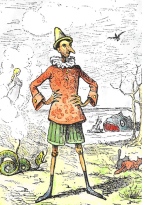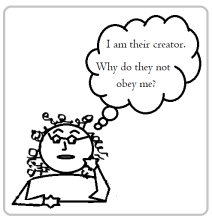Now that we are well into the new year, many of us are finally getting back to work on novels we began for NaNoWriMo or work we had on hold for the holidays.
 This is an excellent time to look at the freedom we give our characters to act and react within the story. I have mentioned many times that I am a plotter. However, when I am in the process of writing the first draft of a novel, the characters sometimes take over. The plot veers far from what I had intended when I began writing it.
This is an excellent time to look at the freedom we give our characters to act and react within the story. I have mentioned many times that I am a plotter. However, when I am in the process of writing the first draft of a novel, the characters sometimes take over. The plot veers far from what I had intended when I began writing it.
 This happens because my work is character-driven, and sometimes, they’re like demolition derby drivers.
This happens because my work is character-driven, and sometimes, they’re like demolition derby drivers.
When a significant change happens, I have to adjust events to match the timeline. Adjusting my outlines is a simple process because I create them in Excel. I can delete and move events as needed to ensure my story arc doesn’t flatten.
Other people use whiteboards and sticky notes, and still others use Scrivener—a program my style of thinking doesn’t mesh with.
I tried Scrivener but grew too frustrated, so I returned to my good old Excel spreadsheet program. Google Sheets works well too, and it’s free.
Usually, the ultimate ending never changes no matter what the characters do. However, the path to that place can go quite far afield from what was initially intended.
I try to keep the plot moving so that it flows naturally. The characters must still act and speak individually, the way that I envision them. I want their uniqueness to remain central to the story, even if their motives and actions evolve from what I first planned.
 This is called giving your characters “agency.” Agency is an integral aspect of the craft of writing. It means that you allow your characters to make decisions that don’t necessarily follow the original plot outline. This gives them a chance to become real, the way Pinocchio wanted to be a real boy and not a puppet.
This is called giving your characters “agency.” Agency is an integral aspect of the craft of writing. It means that you allow your characters to make decisions that don’t necessarily follow the original plot outline. This gives them a chance to become real, the way Pinocchio wanted to be a real boy and not a puppet.
Many times, the way to avoid predictability in a plot is to introduce a sense of danger early, a response to an unavoidable, looming threat. Every character has a different personality and should respond to each event differently. The freedom you allow the protagonist and antagonist to steer the events is crucial for them to emerge as real to the reader.
In literary terms, “agency” is the ability of a character to surprise the author, and therefore, the reader. If you plan their every response when you are writing them, it can feel canned and boring. The most exciting moments I’ve had as an author are when my characters surprise me and take over the story.
Sometimes my characters make their own choices. Other times, they go along as I, their creator, have planned for them. Ultimately, they do what I intend for them, but they always do it their own way and with their own style.
Plotting, for me, means setting out an arc of events for a story that I hope to write. I do this in list form in a new Excel workbook. My outline workbook will contain several spreadsheets. On page one, I create the characters and give them personality traits. On page two, I list the order of events that I think will form the arc of the story.
When my characters begin evolving, new events are added. My plot outline must continually evolve with them so that I don’t lose control of the arc and go off on a side quest to nowhere. The evolution of the outline happens once I begin writing because that is when I get to really know my characters. Only when the writing commences can they make choices and say things that surprise me.
That is when they have agency.
When I first consider writing a new novel, I get the idea out of my head by creating a plot outline. For me, introducing the threat and warning signs of inescapable danger early in the story arc limits my habit of writing too much backstory. Their history can happen off-screen, in a file marked Backstory. That way, I get to know my characters, but no one is going about “life as normal” in the narrative. Readers aren’t looking for ordinary—they have enough of that in real life.
Each character will be left with several consequential choices to make in every situation that arises along the timeline. I consider the personality and allow the characters’ reactions to fit who they are.
 No matter how they respond, they will be placed in situations where they have no choice but to go forward. After all, I am their creator, the deity of their universe. I have an outline that predestines them to specific fates, and nothing they can do will stop that train.
No matter how they respond, they will be placed in situations where they have no choice but to go forward. After all, I am their creator, the deity of their universe. I have an outline that predestines them to specific fates, and nothing they can do will stop that train.
The consequences my characters face for their choices affect the atmosphere and mood of the story as it emerges. Think about it—if there are no consequences for bad decisions a character might make, everyone goes home unscathed. So why bother writing at all?
So, while I am an outliner and plotter, I also fly-by-the-seat-of-my-pants to a certain extent. I love it when my characters take over and drive the story.
Credits and Attributions:
Lowenburg at the English Wikipedia, CC BY-SA 3.0 <http://creativecommons.org/licenses/by-sa/3.0/>, via Wikimedia Commons
Pinocchio by Enrico Mazzanti (1852-1910), Public domain, via Wikimedia Commons








Reblogged this on Kim's Musings.
LikeLiked by 1 person
Kim, thank you for the reblog! You get a virtual hug!
LikeLiked by 1 person
Pingback: Agency and Consequences #amwriting | Life in the Realm of Fantasy
Reblogged this on Chris The Story Reading Ape's Blog.
LikeLike
Thank you for the reblog, Chris ❤
LikeLiked by 1 person
Welcome, Connie 🤗
LikeLike
Reblogged this on NEW BLOG HERE >> https:/BOOKS.ESLARN-NET.DE.
LikeLiked by 1 person
❤ Thank you, Michael ❤
LikeLike
I enjoy throwing my characters into a difficult situation to see what they do. I’m a pantser so I never have a pre-conceived idea of what will happen. Broke my heart when a favourite character got himself killed. Had tears streaming down my face as I watched it happen.
LikeLiked by 1 person
I’ve had similar experiences. Different circumstances of course, but protagonists and antagonists can be so contrary in the first draft. The wayward things just insist on forcing me to adjust the plot to fit their decisions, lol!
LikeLike
Pingback: Agency and Character Development #amwriting by Connie J. Jasperson – DEEZ – News about Art, Books & more
Pingback: Celebrating the Holidays in a Century Village by Traci Kenworth | Loleta Abi Romance Author